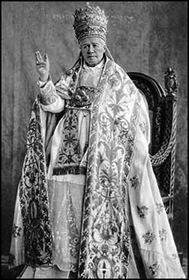
Lacking in nothing that maketh a good pastor, he laboured particularly to teach young men called to the priesthood, as well as fostering the growth of devout associations and the beauty and dignity of divine worship. He would ever affirm and promote the laws upon which Christian civilisation depend, and while leading himself a life of poverty, never missed the opportunity to alleviate the burden of poverty in others. Because of his great merits, he was made a cardinal and created Patriarch of Venice. After the death of Pope Leo XIII, when the votes of the College of Cardinals began to increase in his favour, he tried in vain with supplications and tears to be relieved of so heavy a burden. Finally he ceded to their persuasions, saying I accept the cross. Thus he accepted the crown of the supreme pontificate as a cross, offering himself to God, with a resigned but stedfast spirit.
Placed upon the chair of Peter, he gave up nothing of his former way of life. He shone especially in humility, simplicity and poverty, so that he was able to write in his last testament: I was born in poverty, I lived in poverty, and I wish to die in poverty. His humility, however, nourished his soul with strength, when it concerned the glory of God, the liberty of Holy Church, and the salvation of souls. A man of passionate temperament and of firm purpose, he ruled the Church firmly as it entered into the twentieth century, and adorned it with brilliant teachings. He restored the sacred musick to its pristine glory and dignity; he established Rome as the principal centre for the study of the Holy Bible; he ordered the reform of the Roman Curia with great wisdom; he restored the laws concerning the faithful for the instruction of the catechism; he introduced the custom of more frequent and even daily reception of the Holy Eucharist, as well as permitting its reception by children as soon as they reach the age of reason; he zealously promoted the growth of Catholic action; he provided for the sound education of clericks and increased the number of seminaries in their divers regions; he encouraged every priest in the practice of the interior life; he brought the laws of the Church together into one body; he condemned and suppressed those most pernicious errors known collectively as Modernism; he suppressed the custom of civil veto at the election of a Supreme Pontiff. Finally worn out with his labours and overcome with grief at the European war which had just begun, he went to his heavenly reward on the twentieth day of August in the year 1914. Renowned throughout all the world for the fame of his holiness and miracles, Pope Pius XII, with the approbation of the whole world, numbered him among the Saints.




